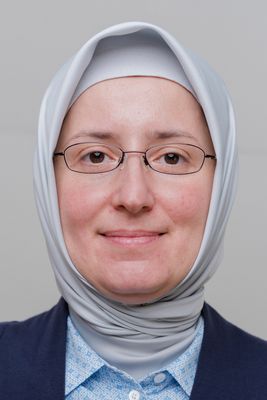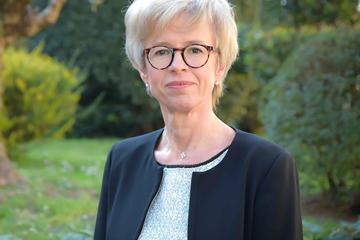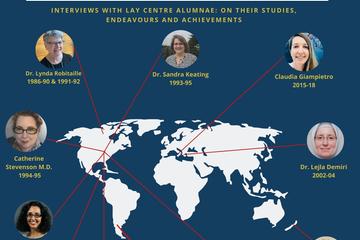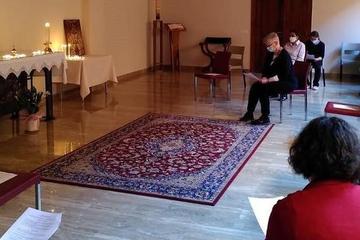
Dr. Lejla Demiri, chair of Islamic doctrine at the Center for Islamic Theology, University of Tübingen, talks to us about women's role in education, “green theology,” and building bridges.
What was your area of study and which pontifical university did you choose and why?
Having completed my studies in Islamic theology, in early 2002, I came to Rome on a Nostra Aetate scholarship to study Christian theology with the intention to spend only one semester — and I ended up staying two and a half years! A typical story for many students in Rome. I was first registered as an auditing student at the Pontifical University of St. Thomas Aquinas (Angelicum) and later moved to the Pontifical Gregorian University, where I obtained my post-graduate diploma and licentiate in interreligious studies. I also had the opportunity to take some courses at the Pontifical Oriental Institute, as well as at the Pontifical Biblical Institute, which were relevant to my research interests. Thanks to the courses offered, I was able to explore different aspects of Christian theology, including Scripture, doctrine, Church history, and how Christianity relates to other faith traditions, especially Islam and Judaism.
What opportunities did your studies offer and how are your studies at the pontifical university related to the work you do today?
My studies in Rome provided me with a unique opportunity to learn about Christianity from its own sources and experts in the field, who have dedicated their lives to serving their faith. In Rome, the learning process is not confined to the walls of the classroom. The vibrant community life at The Lay Centre had a huge role in forming and further shaping my knowledge of Christianity as a lived religion. Discussions over dinner, often attended by esteemed guests, be they scholars, diplomats, Vatican officials, old friends or former Lay Centre students; extracurricular activities in the form of conferences and lectures; visits to religious sites within the city or beyond; retreats and religious gatherings: these were all occasions offering invaluable insights into the Catholic faith and spirituality.
What advice would you give lay women who would like to study in Rome?
Firstly, pontifical universities have a lot to offer. It is important to choose what fits best with your research interests and study plans. The good news is that you can always take individual courses in different universities and mix and match according to your needs. Registration is uncomplicated. Secondly, there is accommodation. Instead of being on your own, I would recommend staying in a community such as The Lay Centre. This would not only save you time adjusting to the hustle and bustle of Roman life but, more importantly, it would provide you a welcoming home and a profound experience in living together in a community that recognizes human diversity as a positive means of learning about different cultures and religions.
How did your studies help you to become more able to build bridges between Muslims and Catholics?
My study in Rome not only enabled me to gain knowledge about Christianity but also offered a wealth of opportunities to connect with Christians — lay students and academics, priests, monks, nuns and seminarians — and to learn about their ways of dealing with the challenges of the 21st century. In addition to my research in interfaith matters, one of the activities that I find most fulfilling is organizing study trips to Rome for my own students. I have been inspired to plan and realize these trips several times now, thanks to the experience I gained as a student in Rome and the wonderful friendships I have forged there. In particular, Dr. Donna Orsuto and her Lay Centre team deserve special mention and thanks for their warmth and support.
What do you think is an area of most pressing concern in your field of study or of your profession?
One of the areas of most pressing concern is to offer a theological response to the growing concerns of climate change and its global impact. Care for creation, so often emphasized and encouraged in both of our traditions, should lead to more eco-oriented theologies and interfaith conversations. This is, for instance, what prompted a group of Muslim and Christian theologians to organize a conference in 2019 on “Green Theology: Emerging 21st Century Muslim and Christian Discourse on Ecology,” the proceedings of which will be published soon.
What, in your opinion, is the importance of women in education?
The rising importance of women in education is indisputable, as indicated by the growing number of female students at universities nowadays. In our department, for instance, the majority of students are female. A similar trend is observable in various other fields of the humanities. However, as you move up the ladder, the ratio of female-to-male doctoral, post-doctoral researchers or professors decreases. It is there that more female voices are needed, particularly in theology, Christian as well as Islamic. The wealth of female wisdom and the woman’s vision of God and faith have a lot to offer to today’s divided world.
Dr. Lejla Demiri, born in Macedonia, now lives in Germany and is chair of Islamic doctrine at the Center for Islamic Theology, University of Tübingen. After completing her BA and MA in Islamic theology (Marmara University, Istanbul), she went to Rome to study Christian theology with the assistance of the Nostra Aetate scholarship from the Pontifical Council for Interreligious Dialogue. In Rome, she obtained her post-graduate diploma and her licentiate in interreligious studies (Pontifical Gregorian University). She received her PhD from the University of Cambridge (2008), and held post-doctoral fellowships at Trinity Hall, Cambridge (2007-10) and the Free University of Berlin (2010-12). Her research explores systematic theology and the intellectual history of Islam and Muslim-Christian theological encounters. She publishes extensively on theological and interreligious matters. She is the author of “Muslim Exegesis of the Bible in Medieval Cairo” (Brill, 2013), and co-editor of “The Future of Interfaith Dialogue” (with Yazid Said; Cambridge University Press, 2018) and “Early Modern Trends in Islamic Theology” (with Samuela Pagani; Mohr Siebeck, 2019). She also serves as section editor for “Christian-Muslim Relations: A Bibliographical History” (1500-1900) (Brill, 2012-present), and senior editor (Islam) of “St. Andrews Encyclopaedia of Theology” (2019-present). Dr. Demiri is a Lay Centre alumna (2002-04).
Photos courtesy Dr. Demiri.
We also asked our alumnae to share a special photo from their Lay Centre days. Dr. Demiri shared the one below:
Dr. Donna Orsuto, Lay Centre director, introduces Dr. Demiri to The Lay Centre cat, Sylvester.
.jpg)


